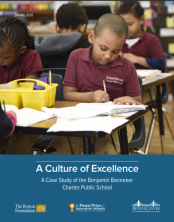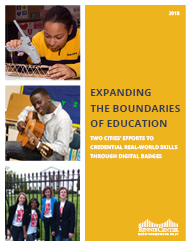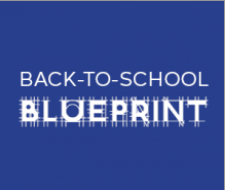Our team works directly with schools, districts, and organizations to explore and evaluate a variety of cutting-edge issues facing public education. With a focus on the entire education continuum from early childhood through adulthood, our researchers are skilled in both qualitative and quantitative data collection and seek to gain a holistic understanding of educational strategies by listening to and learning from those most impacted. Here are some of the services our research team offers to support practitioners and policymakers and build knowledge of effective practice in schools across the Commonwealth:
Case Studies
Our case studies examine specific strategies that schools, districts, and organizations use to improve outcomes for students. Our team speaks directly with educators and students through a range of research methods—interviews, focus groups, surveys, and observations—to gather evidence on the efficacy of these strategies. We are skilled at communicating a program’s unique story and reporting our findings in accessible, user-friendly case studies. The most important component of our approach to case studies is that we assume the role of learner when working with a site, asking questions and listening carefully to the answers to identify core themes. Examples of this work include:
 Pozen Prize for Innovative Schools
Pozen Prize for Innovative SchoolsOur team has researched and written a number of case studies on the recipient of the annual Pozen Prize for Innovative Schools. To uncover the school-level practices that underpin these successful school transformations, our team reviews existing literature, develops research questions, conducts site visits and observations, interviews a variety of stakeholders—including students, alumni, community partners, teachers, and administrators—analyzes findings, and writes a final report. For example, one of our reports looks at the Benjamin Banneker Charter Public School.
Additional examples of case studies include: The BoSTEM Initiative: Creating Pathways to the STEM Workforce | Teaming up for Change: Teacher-Driven Transformation at the Mildred Avenue K-8 School
Research Briefs
Our research briefs are deep dives into specific topics within the education landscape. This work is grounded in original research and insights from independent data collection methods including interviews, focus groups, document reviews, surveys, and observations. Our team goes beyond analyzing existing literature, instead seeking to surface new knowledge and conclusions that support effective decision-making—and, when necessary, challenge existing perspectives on how to better serve students and families. Our research briefs are open-source and shared in user-friendly formats aimed at informing discussion among policymakers and practitioners. Examples of this work include:
 The Power Gap in Massachusetts K-12 Education: Examining Gender and Racial Disparities Among Leadership
The Power Gap in Massachusetts K-12 Education: Examining Gender and Racial Disparities Among Leadership We teamed up with the Eos Foundation to study the challenges of achieving gender parity within Massachusetts’ K-12 leadership positions. This process included intensive original research and data collection including a detailed scan of gender and race data for superintendents, teachers, principals, district administrators, and school committee members in 180 Massachusetts school districts. We also conducted a series of interviews with K-12 leaders who identify as women and/or people of color to gather their perceptions related to leadership opportunities in Massachusetts.
Additional examples include: Career Pathways for Boston's Opportunity Youth | Building Local: Lessons from Massachusetts Communities on Reengaging Opportunity Youth | Bridging the Gap: How Wentworth provides a personalized & local approach to college and career readiness
Program Monitoring and Evaluation
Our team has a long history of documenting program effectiveness through monitoring and evaluation. We have expertise in both quantitative and qualitative data collection, including developing data collection tools and strategies. We work with schools and programs to evaluate current conditions and define actionable strategies for moving forward. By engaging with a variety of stakeholders, we seek to gain a holistic view of programs we evaluate, learning not just what happened but how it happened. Examples of this work include:
 Digital Badging Pilot Evaluation
Digital Badging Pilot EvaluationOur team worked with Boston Public Schools, Boston After School & Beyond, and the Providence After-School Alliance to conduct a developmental evaluation on how these groups operationalize digital badges as part of their program models. Rennie Center researchers conducted interviews and focus groups with many stakeholders, including teachers, leaders within after-school programs, and students. When collecting data and feedback in group settings with young people, our team is skilled in assisting all group members to participate. The final evaluation report offered useful insights for participating programs on how to continue strengthening their model, and it also provided guidance to other communities seeking to initiate digital badging work of their own.
Additional examples available upon request.
Evidence-based Tools
Our evidence-based tools are interactive guides meant to support practitioners in taking action. These guides combine rich content with dynamic features, connecting educators to a wealth of resources. Based on rigorous research and understanding of effective practice, our guides include templates, rubrics, and other tools intended to be used as an interactive blueprint for putting new strategies in place. Examples of this work include:
 Back-to-School Blueprint
Back-to-School BlueprintIn response to school closures at the beginning of the COVID pandemic, the Rennie Center created an interactive series of research-based, online action guides to help schools reopen and address the academic challenges and trauma experienced by far too many students. The guides’ user-friendly interface and carefully mapped-out steps enabled education leaders and practitioners to engage in training and adapt new policies independently, maximizing the impact of the resources. Specific guides focused on issues ranging from Helping Students Heal from Trauma to Accessing Grade-Level Content to Rebuilding Community.
Additional examples include: Supporting Unhoused Students: A Blueprint for MA Schools | STEM Pathways Blueprint | Early College Blueprint: A Guide to Getting Started with Early College in Massachusetts
If you are interested in working with our team on a research project please contact our Senior Director of Research Annelise Buzaid.
